We went for a lovely ride down to Kisantu to the very Western edge of the country. The drive is about 2 hours, on an amazingly paved road all the way. I felt like Dorothy going on the yellow brick road:
Follow the yellow brick road. Follow brick road. Follow, follow, follow, follow, follow the yellow brick road!!! We're off to see the wizard, the wonderful wizard of OOooooz!
Sigh. I've sunk low. I think I have a serious case of Movie Withdrawal.
Anyways, we were traveling with an American who was coming back to his beloved Congo after a long hiatus. He marveled at the state of the road, and pointed out various interesting features of the area: "see where the bamboo has been planted to hold the road in? that's where we had to negotiate with a military blockade to get past it. Oh there's another ancient blockade point. This is where we nearly got arrested. This is where 20 trucks got stuck in the road and it took us 3 hours to navigate through all of them to complete the 2 km stretch of road". Lovely indeed. I'm happy to know that the area has improve a bit.
Then we had a two hour lunch with a Congolese buddy of his. His thirteen-year-old son had killed his own chicken in honor of us. I tried to grin and nod appreciatively while trying to hold the meat inside my mouth.
Unfortunately, we were not able to see the famous botanical gardens as we had to pass a military checkpoint between Kisantu and Kinshasa before 6PM. Sigh, little bitty changes.
September 19, 2005
Car Skills
I'm not really in the mood to write, but if I don't, all these memories will be lost...This makes me think of a quote from Blade Runner, from that weirdly white and translucent android dying in the rain:
I've seen things you people wouldn't believe.
Attack ships on fire off the shoulder of Orion.
I watched C-beams glitter in the dark near the Tannhauser gate.
All those moments will be lost in time, like tears in rain.
Time to die.
Anyways, before I get to wrapped up in how amazing this movie is, I should tell you about my night on Friday. See I got home a little late (2PM) and wanted to park the huge Mega-truck in the parking lot of my new apartment building. Only, no luck, there were no parking lots in the front.
So I wake up the parking attendant, who enlists the help of one of his buddy. They gesture enthusiatically in my direction to let me know that there is a spot in the back. I navigate the slender alleyway to the back, only to find that the parking spot they point to is ludicrously small. I shake my head sadly but, to indulge their enthusiasm ("you'll fit I swear!!"), I give it a go. No luck. I leave for yet another parking spot where they enthusiastically wave and gesture and shout to "help me" park my car. No luck either. But they insist, telling me that there is PLENTY of space. So I force my way in...and get stuck in a sand bank. They actually have to dig two of my wheels from the sand; and the car is so precariously perched in the little hill that is actually angling toward a metal pipe, therefore wedging myself inside the space even more.
I grumble and get the following instructions
They: move forward more!
Me: I can't.
They: Of course you can, move forward more!!
Me (opening the door to show them the pressure that my foot is putting on the accelerator): no, see I really, really can't, the wheels are turning in the sand
They (emphatically): OK then back up
Me: --
I got so frustrated that after the car started smelling like burning and I couldn't start it again, I slammed the car door, stormed off, constrained myself, and semi-politely asked them "Have you ever driven in your life?", to which the answer is "no".
AAAAaaaarggghhh!
**More to come on the new apartment and Kisantu**
I've seen things you people wouldn't believe.
Attack ships on fire off the shoulder of Orion.
I watched C-beams glitter in the dark near the Tannhauser gate.
All those moments will be lost in time, like tears in rain.
Time to die.
Anyways, before I get to wrapped up in how amazing this movie is, I should tell you about my night on Friday. See I got home a little late (2PM) and wanted to park the huge Mega-truck in the parking lot of my new apartment building. Only, no luck, there were no parking lots in the front.
So I wake up the parking attendant, who enlists the help of one of his buddy. They gesture enthusiatically in my direction to let me know that there is a spot in the back. I navigate the slender alleyway to the back, only to find that the parking spot they point to is ludicrously small. I shake my head sadly but, to indulge their enthusiasm ("you'll fit I swear!!"), I give it a go. No luck. I leave for yet another parking spot where they enthusiastically wave and gesture and shout to "help me" park my car. No luck either. But they insist, telling me that there is PLENTY of space. So I force my way in...and get stuck in a sand bank. They actually have to dig two of my wheels from the sand; and the car is so precariously perched in the little hill that is actually angling toward a metal pipe, therefore wedging myself inside the space even more.
I grumble and get the following instructions
They: move forward more!
Me: I can't.
They: Of course you can, move forward more!!
Me (opening the door to show them the pressure that my foot is putting on the accelerator): no, see I really, really can't, the wheels are turning in the sand
They (emphatically): OK then back up
Me: --
I got so frustrated that after the car started smelling like burning and I couldn't start it again, I slammed the car door, stormed off, constrained myself, and semi-politely asked them "Have you ever driven in your life?", to which the answer is "no".
AAAAaaaarggghhh!
**More to come on the new apartment and Kisantu**
September 16, 2005
Brush with Celebrities
On Wednesday, I met up with two bloggers in Kinshasa Lulu on the Bridge and Timothée. Not only are they fellow bloggers in the DRC, they are also nice, well-adjusted people.
Who would have thought?
Who would have thought?
September 15, 2005
Photos of Mwene Ditu
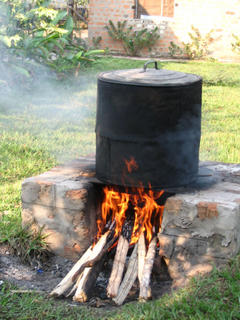
Wahsing Machine: the sisters boil their clothes, sheets and hospital linens in a large barrel before pounding them on two large stone bassins and hanging them out to dry
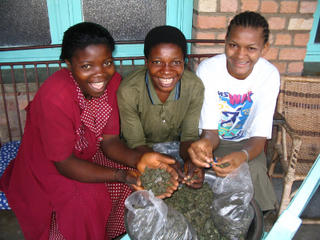
Sorting Pondu: Three teenagers help out at the convent by sorting dried pondu (manioc) leaves.
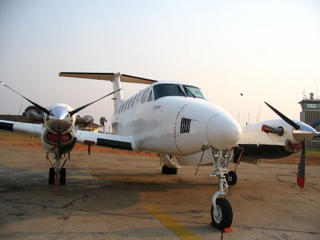
Small Plane: this is a small 7-seater plane that we were lucky enough to be able to board. We didn't have to go to the large N'djili airport, which made the trip about 90% more pleasant.
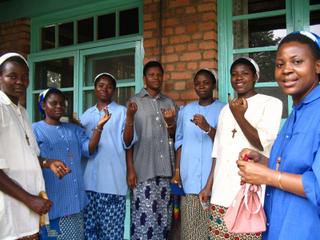
Sisters Enroll: sisters in Mwene Ditu just came back from getting enrolled, showing their ink blackened finger with pride
September 14, 2005
Pictures of Mwene Ditu 2

This old Belgian house--completely isolated in the region of Kanda Kanda--now houses a health team that overseas a variety of health centers. Despite having upheld 40 years well (the ceiling is still perfect, made from gorgeous dark wooden slats), a massive rehabilitation work is necessary--starting with windows and doors

Palm oil is made from nuts from a type of palm tree, ground in a large wooden grinder and manually powered by two strong village boys

Same beer, different marketing label in the diamond town

The snaking Congo River cuts a space in the deeply concentrated forest (note: upon reflection and various comments on this blog, I looked at a map and think it's more probably to be the Lukenie River)
Pictures of Kole
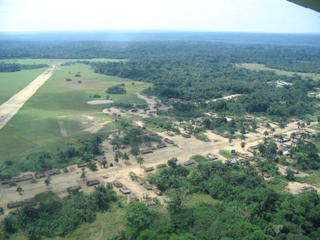
A view of the little town of Kole from the 2-seater airplane

A view of Kole behind a shaded veranda.

Moms await their turn to be vaccination for Tetanus under the shade of umbrellas. In some regions, mothers refuse to be vaccinated, fearing the vaccine to contain powerful sterilizing ingredients. This center attracts dozens of women by sensitizing the community.

In the forest, women walk to their cultivated plots to gather the manioc. The “Maman” swiftly peels the thick bark of the tuber with a machete before setting it in her backpack. She shows a large goiter due to iodine deficiency in her diet
Kole 2
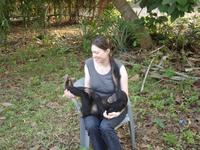
Bond and Bonobo (Antonia) bonding...
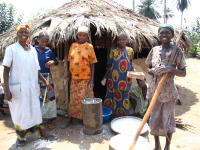
A nurse shows me where manioc is pounded into flour to feed the malnourished children. Manioc has no nutritional value—but their diet with be supplemented by Pondu and a little bit of meat, bananas.
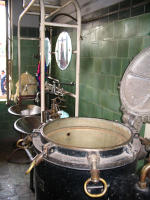
A corner of the nicest hospital of the region. The sinks don’t work since there is no running water. In the foreground is an old autoclaved machine used to sterilize syringes and other equipment fired with coal.
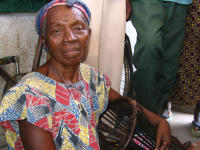
An old woman sits outside the waiting room, awaiting treatment. She has facial marking that can be seen on a few elders of the region. She is holding her weaved backpack to bring back medicine.
September 12, 2005
Videoblogging
Does anybody know anything about videoblogging? I tried to look it up but it seemed terribly complicated, especially if you have a sloooow internet connection.
Thanks for the info computer gee...computer experts!
PS: I would really like to post some of my friends retarded Congo Adventure videos
Thanks for the info computer gee...computer experts!
PS: I would really like to post some of my friends retarded Congo Adventure videos
September 08, 2005
Hurricane Katrina
I was on the field when I heard about the hurricane. Luckily I was in Lodja by then and we watched at bit of news powered by high-priced gasoline.
From the little I understand, there were a set of circumstances that went wrong: terrible weather, logistical difficulties, poor planning, lack of leadership and just general poor luck. Did I get the gist of it?
It saddens me that the United States, a country with some of the best infrastructures and emergency equipment in the world, couldn't get a handle on the situation, despite knowing AHEAD of time that this disaster would happen.
Perhaps the government should hire Emergency Coordinators from International NGOs in such situations?
I'm confused.
From the little I understand, there were a set of circumstances that went wrong: terrible weather, logistical difficulties, poor planning, lack of leadership and just general poor luck. Did I get the gist of it?
It saddens me that the United States, a country with some of the best infrastructures and emergency equipment in the world, couldn't get a handle on the situation, despite knowing AHEAD of time that this disaster would happen.
Perhaps the government should hire Emergency Coordinators from International NGOs in such situations?
I'm confused.
Humbling Luggage Experience
Today I brought my luggage to work because I had a lock that just wouldn't open (cheap piece of sh*** from Senegal). My Admin guy comes with a pair of sharp scissors and says "I don't want to worry you but..." then he jimmies the zipper with the end of the scissors and opens up the seam to reveal the content of the suitcase.
Yikes! Now I understand why people in Africa bind their luggage with layers and layers of duct tape--this discourages a carrier from illegally searching the luggage. I had assumed the suitcases were busted and were held together by tape.
Next, he gave a little bang with the end of the scissors and pushed the loop of the lock, and it springed open, gutted with the small inside-spring hanging on the outside.
What the heck was this guy's job before he came to work for us? He just laughed when I asked him the question.
Yikes! Now I understand why people in Africa bind their luggage with layers and layers of duct tape--this discourages a carrier from illegally searching the luggage. I had assumed the suitcases were busted and were held together by tape.
Next, he gave a little bang with the end of the scissors and pushed the loop of the lock, and it springed open, gutted with the small inside-spring hanging on the outside.
What the heck was this guy's job before he came to work for us? He just laughed when I asked him the question.
4 Sept 2005
Day Seven
Lodja
I decide to go to church in the morning despite my body protesting that I still need sleep. The church is a rather simple building where villagers gather to celebrate mass in Tetela (the local language). Though I understand nothing, I can see that the priest is very charismatic and makes his audience laugh. Then the choral starts singing accompanied by local drums carved out of whole pieces of wood (they don’t have the characteristics skin stretched over them, they are made from hollow rectangular wood). The voices of the young women and men rise up, followed by the droning voices of the elders, the music amplified by the building, sounding louder than a nirvana concert. Looking around at those people who have been pillaged and hurt, wearing their nicest clothes (at best the clothes are distended and slightly discolored, at worst they are not wearing shoes), nursing their babies—the ones that haven’t died of malnutrition and diarrhea, their voices clear and bold, swaying to the rhythm of the drums and the choral and I suddenly feel this burst of emotion and have to step outside before I burst out crying..
I cry and cry and cry some more, probably due in part to fatigue but also due to pent up emotion. I am ashamed of my self-doubts, my wanting to go home because it’s too hard. But mainly, I touched by the sheer strength of the Congolese people: standing so straight and singing with such power. It seems that no pillaging, no lies, no poverty is going to break their spirits. After church, we set off outside and proceed to shake everybody’s hand in a line that curves around the building.
A few expressions I learned along the way:
Republique Democratique du Congè
Democratic Republic of Vacation
Comment ca va? Pas plus que vous (no better than you)
Q: How are you doing? A: No better than you
Comment ca va?Au rythme du Pays
Q: How are you doing? A: As well as the country is
Lodja
I decide to go to church in the morning despite my body protesting that I still need sleep. The church is a rather simple building where villagers gather to celebrate mass in Tetela (the local language). Though I understand nothing, I can see that the priest is very charismatic and makes his audience laugh. Then the choral starts singing accompanied by local drums carved out of whole pieces of wood (they don’t have the characteristics skin stretched over them, they are made from hollow rectangular wood). The voices of the young women and men rise up, followed by the droning voices of the elders, the music amplified by the building, sounding louder than a nirvana concert. Looking around at those people who have been pillaged and hurt, wearing their nicest clothes (at best the clothes are distended and slightly discolored, at worst they are not wearing shoes), nursing their babies—the ones that haven’t died of malnutrition and diarrhea, their voices clear and bold, swaying to the rhythm of the drums and the choral and I suddenly feel this burst of emotion and have to step outside before I burst out crying..
I cry and cry and cry some more, probably due in part to fatigue but also due to pent up emotion. I am ashamed of my self-doubts, my wanting to go home because it’s too hard. But mainly, I touched by the sheer strength of the Congolese people: standing so straight and singing with such power. It seems that no pillaging, no lies, no poverty is going to break their spirits. After church, we set off outside and proceed to shake everybody’s hand in a line that curves around the building.
A few expressions I learned along the way:
Republique Democratique du Congè
Democratic Republic of Vacation
Comment ca va? Pas plus que vous (no better than you)
Q: How are you doing? A: No better than you
Comment ca va?Au rythme du Pays
Q: How are you doing? A: As well as the country is
3 Sept 2005
Day Six
Lodja
We are broken and we are tired. I discover the true meaning of the word tired—dog tired, exhausted, beat, worn out, bushed, pooped. My whole body aches and I am morally drained by seeing hospitals with no doors and windows, patients on weaved cots and no sheets and lack of water and electricity in General Hospitals.
We wake at 4:00AM to set of at 5:00AM for our trip back from Kole to Lodja.
The Bishop is kind enough to offer us a ride back to Lodja in his car. It is filled with a Bishop, a nun, a doctor, a mechanic, the driver and me. Being the only one with no valuable function in case of an emergency, I try to make myself useful by snapping loads of pictures. You never know, it might come in handy if National Geographic wants to hire me (hint hint). Again, the trip is quite difficult and we stop 1 hour after our departure to find a huge old truck, stuck in the middle of the road (in essence taking up the whole width of it). It seems its battery ran out. We lend them a little bit a juice but the motor has been so modified, welded and haphazardly fixed that it takes a while until it can be powered again. We set off on our merry way, making the best of the up and down, side to side movement of the car until we find a tree in our way.
The driver gets his ax, the mechanic his machete and they set hacking at it until it can be moved to the side. Back in the car, the sister mumbles “sweet Jesus!” every time the car dips to a 45 degree angle (the two front wheels being at severely different height, it feels like we are going to topple over). I see men carrying dead monkeys and antelopes up to the markets. I see woman with weaved straw backpacks carrying banana leaves, baby, manioc, and pondu (manioc leaves) back to their villages from the forests. I see thousands of butterflies that flitter at the approaching vehicle, bursting their clutter into individual petals of color. I see the Independent Electoral Committee vehicle pass us by and give them two thumbs up for the job of enrollment they are about to do in Kole.
We get out of the car three times to push it up a slope. We even find ourselves filling up a hole to help it get traction on a particularly problematic hill. We get to Lodja just before the rain starts pelting down with fury (imagine the clay road becoming a thick muddy river bank when it rains) and I throw myself on the bed to sleep.
Lodja
We are broken and we are tired. I discover the true meaning of the word tired—dog tired, exhausted, beat, worn out, bushed, pooped. My whole body aches and I am morally drained by seeing hospitals with no doors and windows, patients on weaved cots and no sheets and lack of water and electricity in General Hospitals.
We wake at 4:00AM to set of at 5:00AM for our trip back from Kole to Lodja.
The Bishop is kind enough to offer us a ride back to Lodja in his car. It is filled with a Bishop, a nun, a doctor, a mechanic, the driver and me. Being the only one with no valuable function in case of an emergency, I try to make myself useful by snapping loads of pictures. You never know, it might come in handy if National Geographic wants to hire me (hint hint). Again, the trip is quite difficult and we stop 1 hour after our departure to find a huge old truck, stuck in the middle of the road (in essence taking up the whole width of it). It seems its battery ran out. We lend them a little bit a juice but the motor has been so modified, welded and haphazardly fixed that it takes a while until it can be powered again. We set off on our merry way, making the best of the up and down, side to side movement of the car until we find a tree in our way.
The driver gets his ax, the mechanic his machete and they set hacking at it until it can be moved to the side. Back in the car, the sister mumbles “sweet Jesus!” every time the car dips to a 45 degree angle (the two front wheels being at severely different height, it feels like we are going to topple over). I see men carrying dead monkeys and antelopes up to the markets. I see woman with weaved straw backpacks carrying banana leaves, baby, manioc, and pondu (manioc leaves) back to their villages from the forests. I see thousands of butterflies that flitter at the approaching vehicle, bursting their clutter into individual petals of color. I see the Independent Electoral Committee vehicle pass us by and give them two thumbs up for the job of enrollment they are about to do in Kole.
We get out of the car three times to push it up a slope. We even find ourselves filling up a hole to help it get traction on a particularly problematic hill. We get to Lodja just before the rain starts pelting down with fury (imagine the clay road becoming a thick muddy river bank when it rains) and I throw myself on the bed to sleep.
1 Sept 2005
Day Five
Bena Dibele
After having worked in Kole for a few days, we leave the city towards Bena Dibele, It is a tiring 3 hour motorcycle ride on roads that are barely passable. Bena Dibele used to be a rather important port in the area but since the pillaging by Rwandese soldiers in 2001, it is bare. Nothing is left in the city but a religious brothers’ residence and village huts. During the whole trip, I hear stories of how it used to be before the war. Even the Bishop’s place was completely trashed, his religious objects sold for pittance, his motorcycle and fuel used to terrorize the remaining villagers while the rest of the population (along with a Spanish sister who has been here for 25 years and the Bishop) were living and hiding out in the forest for months. We pass two bridges that were built around the time of the colonization, in the 1950s, that are still holding up admirably well.
After the 3 hour ride, we immediately set off to work visiting various health structures. I feel like a zombie and look worst I’m sure. All I want to do is go to bed and sleep, but I know these people haven’t been visited for a long time, and my visit gives them something to look forward to. The structures are adorned with leaves and flowers for our arrival and I just can’t bear to let them down. We go back to the brothers’ place after our long day to eat and sleep. I take a shower and marvel at the running water there (they have a cistern on the roof) and notice light switches everywhere but no electrical wire to connect them to the dangling light bulbs. Even if the electrical system did work, they wouldn’t be able to purchase the fuel necessary to power the house.
The next day we get up early, go visit another health structure, set off for the return trip of three hours and work some more until 11:00PM.
Bena Dibele
After having worked in Kole for a few days, we leave the city towards Bena Dibele, It is a tiring 3 hour motorcycle ride on roads that are barely passable. Bena Dibele used to be a rather important port in the area but since the pillaging by Rwandese soldiers in 2001, it is bare. Nothing is left in the city but a religious brothers’ residence and village huts. During the whole trip, I hear stories of how it used to be before the war. Even the Bishop’s place was completely trashed, his religious objects sold for pittance, his motorcycle and fuel used to terrorize the remaining villagers while the rest of the population (along with a Spanish sister who has been here for 25 years and the Bishop) were living and hiding out in the forest for months. We pass two bridges that were built around the time of the colonization, in the 1950s, that are still holding up admirably well.
After the 3 hour ride, we immediately set off to work visiting various health structures. I feel like a zombie and look worst I’m sure. All I want to do is go to bed and sleep, but I know these people haven’t been visited for a long time, and my visit gives them something to look forward to. The structures are adorned with leaves and flowers for our arrival and I just can’t bear to let them down. We go back to the brothers’ place after our long day to eat and sleep. I take a shower and marvel at the running water there (they have a cistern on the roof) and notice light switches everywhere but no electrical wire to connect them to the dangling light bulbs. Even if the electrical system did work, they wouldn’t be able to purchase the fuel necessary to power the house.
The next day we get up early, go visit another health structure, set off for the return trip of three hours and work some more until 11:00PM.
August 31st, 2005
Day Three
Kole
The morning, we visit the General Hospital. Having seen 4 or 5 in Congo so far, I have to say that it’s the most impressive. It offers the following services: internal medicine, basic care and treatment, family planning, a maternity with an echogram, radiology, surgery (a woman was even recovering from a mastectomy), a nutritional center for malnourished children, a garden where families of long-term patients could work to make a little bit of money to feed their family members and where the resulting crops where used for the nutritional center, a blood bank (requires electricity for the fridge and willing volunteers) etc…
It is run by a bunch of really energetic missionary sisters who piece together all the money that they can get. Of course, the hospital is not without problems: it needs a serious paint job, it could do with better patient beds and needs mattresses, and there is no running water. Each patient for surgery is required to bring her/her own pail of water.
That lunch, we eat the customary rice, fufu and manioc leaves with antelope meat. I have two helping of the meat that is subtle and brittle. Sooo good. We come to talk about how isolated the health zones of Kole are: two bridges are out requiring a pirogue ride to the other side (imagine motorcycles in swaying pirogues), roads are so shoddy that jeeps cannot pass there. Freight boats are highly unreliable, they take three months to navigate a short stretch of the river due to weak motors and overcharging. Boats even take entire families on them. Since a boat is often way behind schedule (it takes 3 months to get there as opposed to the optimistic “oh it’ll only take 3 weeks”), many family members die on the way from sickness or starvation.
Kole
The morning, we visit the General Hospital. Having seen 4 or 5 in Congo so far, I have to say that it’s the most impressive. It offers the following services: internal medicine, basic care and treatment, family planning, a maternity with an echogram, radiology, surgery (a woman was even recovering from a mastectomy), a nutritional center for malnourished children, a garden where families of long-term patients could work to make a little bit of money to feed their family members and where the resulting crops where used for the nutritional center, a blood bank (requires electricity for the fridge and willing volunteers) etc…
It is run by a bunch of really energetic missionary sisters who piece together all the money that they can get. Of course, the hospital is not without problems: it needs a serious paint job, it could do with better patient beds and needs mattresses, and there is no running water. Each patient for surgery is required to bring her/her own pail of water.
That lunch, we eat the customary rice, fufu and manioc leaves with antelope meat. I have two helping of the meat that is subtle and brittle. Sooo good. We come to talk about how isolated the health zones of Kole are: two bridges are out requiring a pirogue ride to the other side (imagine motorcycles in swaying pirogues), roads are so shoddy that jeeps cannot pass there. Freight boats are highly unreliable, they take three months to navigate a short stretch of the river due to weak motors and overcharging. Boats even take entire families on them. Since a boat is often way behind schedule (it takes 3 months to get there as opposed to the optimistic “oh it’ll only take 3 weeks”), many family members die on the way from sickness or starvation.
August 30th 2005
Day Two
Tshumbe, Kole
We first attempt a flight back to Tshumbe. It is eventless this time around. The landing strip is in pretty good shape, with tarmac-like material on the ground. I marvel at it and am told that dark termite mounds are crushed and packed on the ground producing a very firm surface.
Next, Jacques, a Congolese pilot trained in the states, takes us in his two seater plane. We fly over miles and miles of thick forest, punctuated by short strips of orange villages. Those villages are truly isolated. The landing strip is less than a kilometer long, paved by sand and its obvious only the small plane could have made that landing
That night, we stay at a religious house with the only guest house in the village. It has running water, a mosquito net and even electricity for 3 hours in the evening.
Tshumbe, Kole
We first attempt a flight back to Tshumbe. It is eventless this time around. The landing strip is in pretty good shape, with tarmac-like material on the ground. I marvel at it and am told that dark termite mounds are crushed and packed on the ground producing a very firm surface.
Next, Jacques, a Congolese pilot trained in the states, takes us in his two seater plane. We fly over miles and miles of thick forest, punctuated by short strips of orange villages. Those villages are truly isolated. The landing strip is less than a kilometer long, paved by sand and its obvious only the small plane could have made that landing
That night, we stay at a religious house with the only guest house in the village. It has running water, a mosquito net and even electricity for 3 hours in the evening.
September 07, 2005
August 29th 2005
Day One
Kinshasa, Tshumbe, Lodja, Kananga
The day starts off early with a departure on a small 9-seater plane. The pilot is cheerfully loading our medicines, chainsaws, microscopes, laptops and luggage in the cargo space.
We are to flight to Tshumbe to leave off three of our colleagues, then my fourth colleague and I are meant to take a 2-seater plane to Kole. The trip is pretty uneventful until we spot the tiny Tshumbe airstrip 3 hours later and wispy clouds indicating strong winds. The pilot attempts to get closer to the strip when the plane is jostled and almost sucked into a storm. We can’t seem to establish radio contact (the only radio in Tshumbe was closed due to the lightning) and we set off for Lodja where we hope the weather is better. By now, the bad weather has spread pretty much everywhere and the jostlings of the airplane are like being on a rollercoaster—that sensation of momentary weightlessness when your heart feels like its going in your throat. Expect roller coasters are designed to do that…and planes aren’t. We can’t establish radio contact with Lodja either and are forced to land in Kananga.
After the customary trouble with immigration –who wants us to pay $20 for each new arriving white person and $30 for each pilot—we go to the only restaurant there and finally eat our lunch at 4:00PM. It looks like we are going to be staying the night there. That evening, the pilot lends me his GPS so I can figure it out: he wants me to map out the Tshumbe and Kole airstrip. At the moment, the two tiny landing strips are not marked on the GPS maps and they do not feel comfortable landing there on a regular basis without some basic information. His handwritten notes sort of look like this:

Kinshasa, Tshumbe, Lodja, Kananga
The day starts off early with a departure on a small 9-seater plane. The pilot is cheerfully loading our medicines, chainsaws, microscopes, laptops and luggage in the cargo space.
We are to flight to Tshumbe to leave off three of our colleagues, then my fourth colleague and I are meant to take a 2-seater plane to Kole. The trip is pretty uneventful until we spot the tiny Tshumbe airstrip 3 hours later and wispy clouds indicating strong winds. The pilot attempts to get closer to the strip when the plane is jostled and almost sucked into a storm. We can’t seem to establish radio contact (the only radio in Tshumbe was closed due to the lightning) and we set off for Lodja where we hope the weather is better. By now, the bad weather has spread pretty much everywhere and the jostlings of the airplane are like being on a rollercoaster—that sensation of momentary weightlessness when your heart feels like its going in your throat. Expect roller coasters are designed to do that…and planes aren’t. We can’t establish radio contact with Lodja either and are forced to land in Kananga.
After the customary trouble with immigration –who wants us to pay $20 for each new arriving white person and $30 for each pilot—we go to the only restaurant there and finally eat our lunch at 4:00PM. It looks like we are going to be staying the night there. That evening, the pilot lends me his GPS so I can figure it out: he wants me to map out the Tshumbe and Kole airstrip. At the moment, the two tiny landing strips are not marked on the GPS maps and they do not feel comfortable landing there on a regular basis without some basic information. His handwritten notes sort of look like this:

Subscribe to:
Comments (Atom)